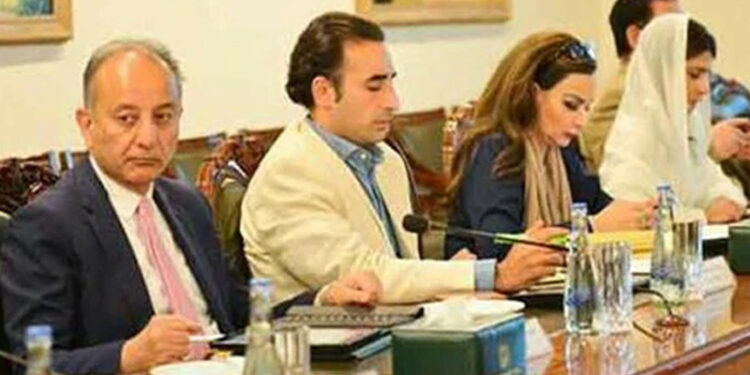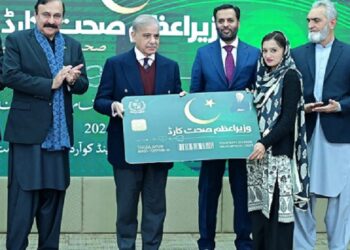New York – A high-level Pakistani delegation led by former Foreign Minister and Pakistan Peoples Party (PPP) Chairman Bilawal Bhutto Zardari has arrived in the United States for a series of critical diplomatic meetings aimed at highlighting India’s alleged human rights violations in Kashmir and aggressive water policies. The delegation will engage with United Nations (UN) representatives, foreign diplomats, and policy experts to bring international attention to what Islamabad calls the “true face” of India under Prime Minister Narendra Modi.
The visit is part of Pakistan’s broader diplomatic efforts to spotlight the Kashmir issue, escalating cross-border tensions, and what it describes as India’s violation of international norms in its handling of water resources shared with Pakistan.
Composition of the Pakistani Delegation
The delegation is comprised of senior political and diplomatic figures, representing a united front in Pakistan’s foreign policy stance. Members include:
- Bilawal Bhutto Zardari – Chairman of PPP and former Foreign Minister
- Senator Sherry Rehman – Former Climate Change Minister and Senate opposition leader
- Hina Rabbani Khar – Former Minister of State for Foreign Affairs
- Jalil Abbas Jilani – Former Foreign Secretary
- Dr. Musadik Malik – Minister of State and economic advisor
Their presence underscores the importance Pakistan places on this diplomatic engagement and its intent to voice concerns at the highest international platforms, particularly at the United Nations Headquarters in New York.
Objective of the Visit: Unmasking Indian Hostilities
Focus on Civilian Deaths and Line of Control Violence
One of the primary issues the Pakistani delegation aims to raise is the continued Indian military aggression along the Line of Control (LoC), which Pakistan claims has led to the deaths of numerous innocent civilians in Azad Jammu and Kashmir (AJK). Islamabad has long accused Indian security forces of violating ceasefire agreements, targeting civilian populations, and committing human rights abuses in Indian-Occupied Jammu and Kashmir (IOJK).
India’s Water Aggression: A Violation of International Treaties
Another key focus of the delegation’s agenda is India’s alleged violation of the Indus Waters Treaty, a World Bank-brokered agreement signed in 1960 that governs the distribution of the Indus River system between India and Pakistan. Pakistani officials have repeatedly expressed concern over India’s construction of dams and water diversion projects in Jammu and Kashmir, which Islamabad views as a strategic attempt to weaponize water resources and economically destabilize Pakistan.
Meetings with UN Security Council Members
The Pakistani delegation is scheduled to meet with ambassadors from all five permanent members of the UN Security Council (UNSC) – namely:
- United States
- China
- Russia
- France
- United Kingdom
In addition, they will hold sessions with diplomats from the nine non-permanent members of the UNSC. These engagements are critical, as Pakistan seeks support for its stance on Kashmir, the ongoing border tensions, and regional water conflicts.
During these meetings, the delegation will present detailed dossiers, visual documentation, and eyewitness accounts to support their claims against Indian actions. The aim is to mobilize international opinion and encourage the Security Council to take a more proactive stance on South Asia’s security and humanitarian issues.
Bilawal Bhutto’s Address to International Media
Bilawal Bhutto is expected to address a gathering of the UN Journalists’ Organization as well as Pakistani media personnel based in New York. His speech will cover Pakistan’s diplomatic narrative on the Kashmir dispute, water-related aggression, and Islamabad’s broader vision for peace and regional stability.
The former Foreign Minister is also expected to outline Pakistan’s diplomatic track record at global forums, reinforcing Islamabad’s calls for bilateral dialogue under international mediation, something India has long opposed by maintaining that Kashmir is an “internal matter.”
Engagements with the UN Leadership
The delegation will hold high-level meetings with:
- UN Secretary-General António Guterres
- President of the UN General Assembly
- Ambassadors of key global and regional players
These interactions are aimed at emphasizing the urgent need for conflict resolution mechanisms in South Asia and ensuring that the situation in Kashmir remains on the international agenda.
Pakistan has, in the past, submitted multiple official complaints and reports to the UN regarding India’s conduct, particularly after the abrogation of Article 370 of the Indian Constitution in August 2019, which revoked the special status of Jammu and Kashmir.
Outreach to the OIC and Non-Aligned Countries
Another vital part of the delegation’s itinerary includes outreach to member states of the Organization of Islamic Cooperation (OIC) and the Non-Aligned Movement (NAM). These multilateral forums have often voiced support for the Kashmiri people’s right to self-determination and condemned human rights violations in the disputed territory.
The Pakistani delegation hopes to strengthen Muslim solidarity on the Kashmir issue and rally broader support against what it calls India’s ultranationalist policies under the Bharatiya Janata Party (BJP).
Reception Hosted for the Pakistani Diaspora in New York
Bilawal Bhutto Zardari will also address a special reception organized for overseas Pakistanis residing in New York. The event is expected to draw a large crowd of professionals, students, and community leaders, as well as American foreign policy experts.
The reception will serve both as a morale booster for the diaspora and a platform to amplify Pakistan’s foreign policy messaging. It will also encourage overseas Pakistanis to take a more active role in raising awareness within their communities and influencing local political representatives in the United States.
Broader Strategic Context: Pakistan’s Diplomatic Push
This visit comes amid rising tensions between Pakistan and India, both nuclear-armed neighbors with a long-standing dispute over Kashmir. Relations have deteriorated further in recent years, particularly after:
- The 2019 Pulwama-Balakot air strikes
- India’s decision to revoke Jammu and Kashmir’s autonomy
- Persistent cross-border skirmishes
- Allegations of Indian disinformation campaigns against Pakistan
- Strategic maneuvers involving water resource control
Pakistan has stepped up efforts to internationalize the Kashmir issue after India has largely succeeded in projecting the matter as a domestic concern on global platforms.
Conclusion: A High-Stakes Diplomatic Effort
The Pakistani delegation’s visit to the United States marks a significant moment in Islamabad’s ongoing attempt to reshape international opinion about India’s actions in South Asia. With a team of seasoned diplomats, former ministers, and policy experts, Pakistan is strategically engaging with global power centers, multilateral institutions, and diaspora communities.
The coming days will reveal how successful this diplomatic campaign will be in drawing global attention to the plight of civilians in Kashmir, challenging India’s water policies, and advocating for peace in a region marred by decades of conflict.

























